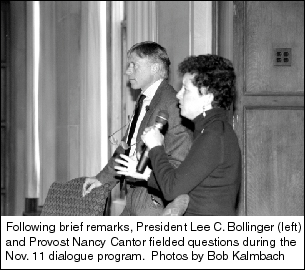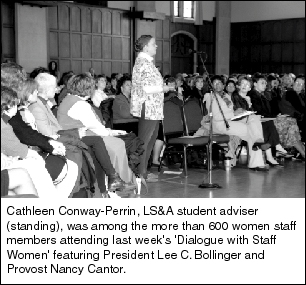The University Record, November 16, 1998
Time off for dependent care to be increased
Mary Jo Frank
Office of Communications
 The number of sick days staff members can use to care for dependents will double to six annually as of Jan. 1, Provost Nancy Cantor announced amid cheers at a noon dialogue session last Wednesday. The session, featuring Cantor and President Lee C. Bollinger, was attended by more than 600 women staff members.
The number of sick days staff members can use to care for dependents will double to six annually as of Jan. 1, Provost Nancy Cantor announced amid cheers at a noon dialogue session last Wednesday. The session, featuring Cantor and President Lee C. Bollinger, was attended by more than 600 women staff members.
The 90-minute program began with short statements by Bollinger and Cantor, followed by questions, which were fielded by both of them, as well as by Jackie R. McClain, executive director of Human Resources and Affirmative Action, and by Laurita Thomas, human resources administrator and associate director of personnel for the Medical Center Human Resources Department.
The dialogue was moderated by Carol Hollenshead, director of the Center for the Education of Women (CEW) and chair of the President’s Advisory Commission on Women’s Issues (PACWI). Joining CEW and PACWI as sponsors were the Commission for Women, Women of Color Task Force, Family Care Resources Program, Sexual Assault Prevention and Awareness Center, and the Office of Equity and Diversity in Human Resources and Affirmative Action.
In introducing Bollinger and Cantor, Hollenshead noted that the U-M’s first female executive officer, then-Vice President for Research Linda Wilson, was appointed in 1975. Today 50 percent of the University’s executive officers, including Cantor as the chief academic officer, are women. Recognizing Bollinger, Hollenshead stated, “Now that is leadership.”
 Bollinger said that he and the provost are appointing deans and other administrators who share their values and trust that their appointees, in turn, will do the same, leading eventually to an institution that is infused with those values—a process that could take several years to see results, he acknowledged.
Bollinger said that he and the provost are appointing deans and other administrators who share their values and trust that their appointees, in turn, will do the same, leading eventually to an institution that is infused with those values—a process that could take several years to see results, he acknowledged.
“Staff are underappreciated in a university setting. This is very unfortunate,” Bollinger said. “Your contributions need to be acknowledged. It is important to make sure that your voices are represented.”
While the University’s size and complexity are an advantage, a large number of communities and constituencies can lead to a pulling apart or splintering, Cantor said. “One of our tasks is to break down the boundaries between students, staff and faculty,” she added, “to allow permeability in voice and representation and interaction.”
In addition to taking an incremental approach to women’s issues through administrative appointments, Cantor said that she and the president are tackling components of larger issues. One area where progress has been made, she said, is in compensation for lower paid staff. Last year additional funds were allocated to increase the base salaries of lower paid staff who are paid through the General Fund. Assuming resources are available, similar increases are planned for the next two years, she explained. Several other non-General Fund units, including the Institute for Social Research and units inside the Medical School and University Hospitals, launched their own programs to improve salaries of lower paid staff, Cantor added.
Audience questions covered a range of topics, including gender-based salary inequity; tolerance for intellectual and lifestyle diversity; policies regarding professional development, tuition reimbursement, and layoffs; flexible work schedules; parking fees; and the effect of M-Pathways on work loads.
Audience members clapped and whistled at a staff member’s suggestion that parking fees be converted to a sliding scale, based on a percentage of salary. The speaker said it is unfair that staff members who earn $20,000 per year pay as much for parking permits as those who earn $80,000–$150,000, while some of the University’s most highly compensated employees pay nothing.
Another question that resonated with the audience dealt with the introduction of M-Pathways. Cantor acknowledged that M-Pathways, which she said holds great promise, has placed additional burdens on staff in the units and central administration. Unfortunately, she said, “we are not able to make it better right away.”
When asked about the merits of part-time work, flextime and job sharing, Cantor said the corporate world appears to have grasped the benefits of offering employees flexibility in scheduling their work more quickly than have academic institutions. Flexibility enhances employee loyalty to the institution, she said, and the University has a number of successful models under way.
Regarding professional development for staff, Bollinger said it is very important that an institution with a core mission of teaching apply that mission to staff too. “We have a relationship with you. If you want to develop skills, we should do everything to help with that. Our attitude should be ‘what can we do to help?’” he added.
Individuals can enhance their own professional development while improving the University community, Thomas said. She cited the Women of Color Task Force’s conference, attended by about 900 people annually. The conference started with five or six women meeting on their lunch hour to talk about career paths and the skills needed to achieve promotions.
McClain invited staff to contact the University’s human resources offices when they have unaddressed concerns about the work environment, policies and procedures, or benefits.
When there is a problem, Bollinger suggested another alternative: Go as a group to the person in charge—the larger the group, the better, he advised.
You can always drop us a line: [email protected].

